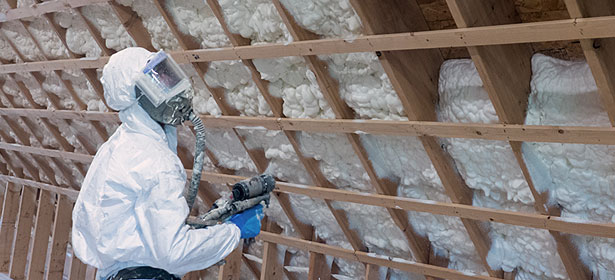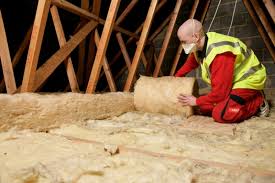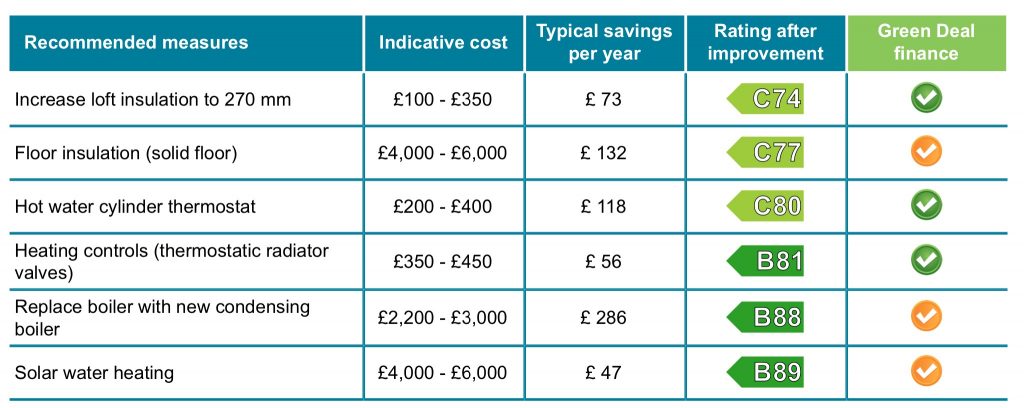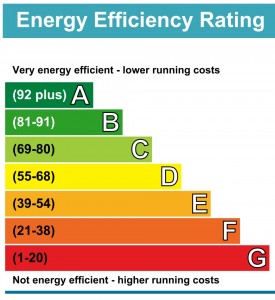I recently signed up for a free home energy survey. After various questions about my home – so not much of a survey – my visitor alighted on spray foam insulation in the loft as a technology that should be of interest to me. Claims included:
- Spray foam insulation would dramatically reduce my heating bills (“save upto 50% on future fuel prices”) – a sum amounting to hundreds of pounds of savings annually.
- Spray foam insulation would result in a better EPC rating and thus increase the resale value of my home ( “.. Eco measures are adding up to 14% on property values.. “).

Given that the salesman attached some credibility to the UK’s national EPC scheme which requires an assessment of each home before sale as evidence for the buyer, then a good start point would be to see what the EPC said about my loft insulation. According to my most recent survey from September 2015 (so almost 4 years old) my home, at that time, had 100 mm of loft insulation between the floor joists with a recommendation to increase to 270 mm thickness by placing another layer of insulation across the top of the floor joists which would reduce my energy consumption by £219 over 3 years. £219 over 3 years amounts to £73 annually. In fact, since the survey was completed, I added the additional insulation recommended in October 2016 so that saving has been made and 1 point improvement on the EPC scale obtained. According to Which? magazine quoting the National Insulation Association “100mm of spray foam insulation is equivalent to around 170mm of loft insulation” so my 270 mm of conventional insulation may provide more insulation than the proposed spray foam insulation. My £73 annual saving from the EPC is far from the hundreds of pounds annually being claimed by my guest. Thus I don’t think the claimed savings are justified.

Then there’s the question about what the impact on my EPC rating would be. The extra 170 mm added post-2015 survey added 1 EPC point to my house rating. That’s not a big increase.
Then there’s the question about what the value of that 1 point on the EPC rating would be. According to the EPC certificate itself the indicative cost of adding 170 mm of insulation is £100 to £350 pounds. I actually paid £300. It’s not reasonable to believe that any additional value added to the home exceeds the cost of doing the work for such a small scale job. The salesman actually left a written claim that “Reports now showing that Eco measures are adding up to 14% to property prices” – I suspect that you’d need a lot of Eco measures (well beyond loft insulation) to add 14% to property prices which would be around £70,000 for my home!
Then there’s the overall question of the cost. Bearing in mind that my current insulation cost £300 and may be equally if not more effective than the spray foam then what was the spray foam quotation for? Discounted to £7,658 with marketing testimonials after the usual call to his boss to get “approval”. Which? reckons £2,500 – £3,000 for a 3-bed semi, whereas I am blessed with a substantial 4-bedroom house so it might conceivably be double the price; but for any investment on that scale I’d want to see competitive prices not just one.
Finally the question arises if I really wanted to spend £7,658 on energy efficiency would more loft insulation be best value? Our old friend the EPC has a proposal in that sort of price range, and one that it believes delivers greater savings. And that proposal is.. floor insulation for my solid concrete floors. The EPC suggests that this can save £132 annually – 81% greater savings than that extra 170 mm of loft insulation albeit at up to 20 times the price. However I already ruled out floor insulation on grounds of poor return. (My guest wasn’t persuaded as to the value of floor insulation, but a check of EPCs on similar neighbouring properties by different surveyors all identified floor insulation as a greater benefit than more loft insulation)

So for me the answer is clear – I don’t see any value in spending £7,658 on alternative loft insulation. For you the answer might be different – you might be planning to convert the loft into dwelling space in which case you want insulation against the tiles/slates rather than at floor level. However if you just wanted storage space then other solutions like a shed, storage unit or skip (!) could easily prove to be better value.


